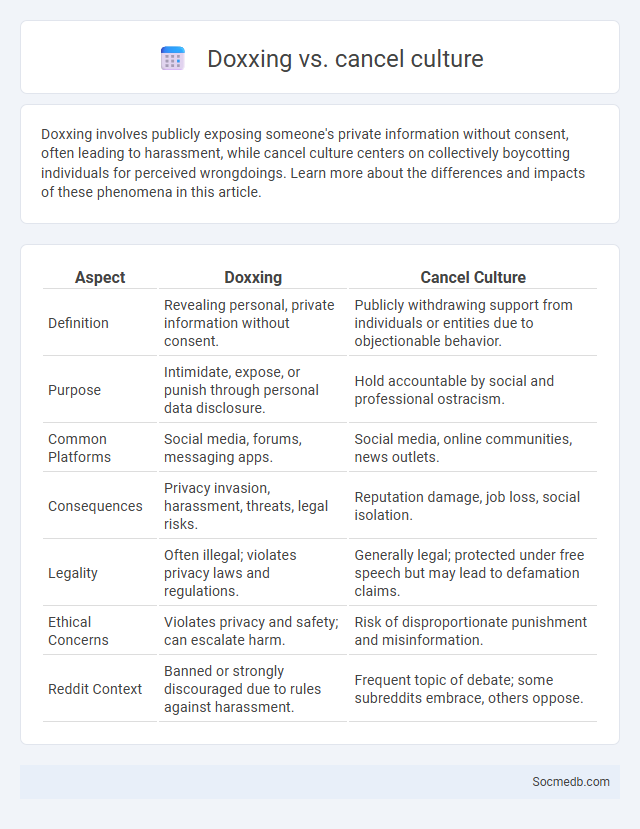
Photo illustration: doxxing vs cancel culture
Doxxing involves publicly exposing someone's private information without consent, often leading to harassment, while cancel culture centers on collectively boycotting individuals for perceived wrongdoings. Learn more about the differences and impacts of these phenomena in this article.
Table of Comparison
| Aspect | Doxxing | Cancel Culture |
|---|---|---|
| Definition | Revealing personal, private information without consent. | Publicly withdrawing support from individuals or entities due to objectionable behavior. |
| Purpose | Intimidate, expose, or punish through personal data disclosure. | Hold accountable by social and professional ostracism. |
| Common Platforms | Social media, forums, messaging apps. | Social media, online communities, news outlets. |
| Consequences | Privacy invasion, harassment, threats, legal risks. | Reputation damage, job loss, social isolation. |
| Legality | Often illegal; violates privacy laws and regulations. | Generally legal; protected under free speech but may lead to defamation claims. |
| Ethical Concerns | Violates privacy and safety; can escalate harm. | Risk of disproportionate punishment and misinformation. |
| Reddit Context | Banned or strongly discouraged due to rules against harassment. | Frequent topic of debate; some subreddits embrace, others oppose. |
Understanding Doxxing: Definition and Origins
Doxxing involves the malicious practice of publicly revealing private or identifying information about an individual online without their consent, often to harass or intimidate. The term originated in the early internet communities of the 1990s, derived from "dropping docs" or documents, reflecting the act of collecting and exposing personal data. Understanding the evolution and motivations behind doxxing is critical for developing effective digital privacy and security strategies in social media environments.
What is Cancel Culture? Key Concepts Explained
Cancel culture refers to the practice of withdrawing support for public figures or brands after they commit offensive or controversial actions, often through social media platforms like Twitter and Instagram. It involves collective actions such as boycotting, shaming, or calling out behavior perceived as unethical or harmful, aiming to hold individuals or entities accountable. Key concepts include public accountability, social justice activism, and digital amplification of social consequences.
The Rise of Personal Information Doxxing
Social media platforms have become hotspots for the alarming rise of personal information doxxing, where private data such as addresses, phone numbers, and financial details are maliciously exposed. This trend threatens your privacy and security, making it crucial to implement strong account protections and be cautious about the information you share online. Understanding the tactics used by perpetrators can help you avoid becoming a victim and maintain control over your digital footprint.
Doxxing vs Cancel Culture: Core Differences
Doxxing involves publicly revealing someone's private information online with intent to harm, whereas cancel culture centers on socially ostracizing individuals due to their actions or views. Your online reputation can be severely impacted by both, but doxxing infringes on personal privacy, while cancel culture primarily affects social and professional standing. Understanding these core differences is essential for navigating your presence on social media responsibly.
Motives Behind Doxxing and Cancel Culture
Motives behind doxxing and cancel culture often stem from desires to hold individuals accountable for perceived unethical behavior or to expose hidden information as a form of social justice. These actions are driven by collective outrage amplified on social media platforms like Twitter, Reddit, and Facebook, where virality increases pressure on public figures and private individuals alike. The dynamic interplay between online anonymity and real-world consequences fuels a culture where digital exposure serves as both punishment and deterrent.
Real-World Examples: Doxxing and Cancel Culture in Action
Doxxing involves publicly revealing private information about individuals on social media platforms like Twitter and Instagram, often leading to harassment or threats, as seen in high-profile cases involving celebrities and activists. Cancel culture manifests through coordinated online campaigns to boycotting or ostracizing individuals or brands based on perceived offensive behavior, exemplified by controversies such as the backlash against Kevin Hart and J.K. Rowling. Both phenomena illustrate social media's power to mobilize public opinion rapidly, impacting reputations and careers in real time.
Legal Implications of Doxxing and Personal Information Disclosure
Doxxing involves the malicious sharing of personal information without consent, leading to significant legal consequences under privacy and harassment laws. Your exposure to doxxing can trigger lawsuits for defamation, invasion of privacy, or cyberstalking, depending on jurisdiction-specific statutes. Understanding and avoiding the unlawful disclosure of sensitive data is crucial to protect yourself from criminal charges and civil liabilities.
Emotional and Social Impacts on Victims
Social media profoundly affects victims by amplifying emotional distress through cyberbullying, harassment, and exclusion, leading to increased anxiety, depression, and feelings of isolation. The pervasive nature of online interactions often exacerbates social stigma and undermines self-esteem, creating long-term psychological challenges. Emotional support and awareness initiatives on platforms can mitigate these impacts, fostering resilience and social connection for affected individuals.
Preventing and Responding to Online Harassment
Preventing and responding to online harassment requires implementing strong privacy settings, reporting abusive content promptly, and fostering respectful digital communication. You should educate yourself on recognizing harmful behavior patterns and utilize platform-specific tools designed to block or mute offenders. Establishing clear boundaries and seeking support from trusted networks empowers you to maintain a safe online environment.
Navigating Ethics: Privacy, Accountability, and Online Behavior
Navigating ethics on social media involves balancing user privacy, platform accountability, and responsible online behavior. Protecting personal data requires robust privacy policies and transparent data handling practices by companies like Facebook and Twitter. Users and platforms share the responsibility to foster respectful interactions and combat misinformation, ensuring ethical standards guide digital communication.
 socmedb.com
socmedb.com